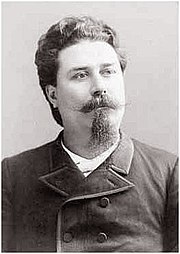Joseph Labadie
| Joseph Labadie | |
|---|---|

Jo Labadie, c. 1880.
|
|
| Born |
Charles Joseph Antoine Labadie April 18, 1850 Paw Paw, Michigan |
| Died | October 7, 1933 (aged 83) Detroit, Michigan |
| Occupation | Labor leader |
Charles Joseph Antoine "Jo" Labadie (April 18, 1850 – October 7, 1933) was an American labor organizer, anarchist, Greenbacker, social activist, printer, publisher, essayist, and poet.
Jo Labadie was born on April 18, 1850, in Paw Paw, Michigan, to Anthony and Euphrosyne Labadie, both descendants of seventeenth century French immigrants of the Labadie family who had settled on both sides of the Detroit River. His boyhood was a frontier existence among Potawatomi tribes in southern Michigan, where his father served as interpreter between Jesuit missionaries and Indians. His only formal schooling was a few months in a parochial school.
Labadie began five years of "tramp" printing and then settled in Detroit as a printer for the Detroit Post and Tribune. He married his first cousin, Sophie Elizabeth Archambeau, in 1877. Their children were Laura, Charlotte, and Laurance, also a prominent anarchist essayist. The family was also involved in the film and the entertainment industry in the Detroit area.
Labadie joined the newly formed Socialist Labor Party in Detroit at the age of 27 and soon was distributing socialist tracts on street corners. As a printer, he was also a member of Detroit's Typographical Union 18 and was one of its two delegates to the International Typographical Union convention in Detroit in 1878.
In 1878 Labadie organized Detroit's first assembly of the Knights of Labor, and ran unsuccessfully for mayor on the Greenback-Labor ticket. In 1880, he served as first president of the Detroit Trades Council, and continued issuing a succession of labor papers and columns for the national labor press, including the Detroit Times, Advance and Labor Leaf, Labor Review, The Socialist, and the Lansing Sentinel, which were admired for their forthright style. His column "Cranky Notions" was widely published.
In 1883 Labadie embraced individualist anarchism, a non-violent doctrine. He became closely allied with Benjamin Tucker, the country's foremost exponent of that doctrine, and frequently wrote for the latter's publication, Liberty. Without the oppression of the state, Labadie believed, humans would choose to harmonize with "the great natural laws...without robbing [their] fellows through interest, profit, rent and taxes." Labadie supported localized public cooperation, and was an advocate for community control of water utilities, streets, and railroads. Although he did not support the militant anarchism of the Haymarket anarchists, Labadie fought for the clemency of the accused because he did not believe they were the sole perpetrators of violence. He broke with the Knights of Labor when their national leader, Terence V. Powderly, repudiated the defendants completely.
...
Wikipedia
